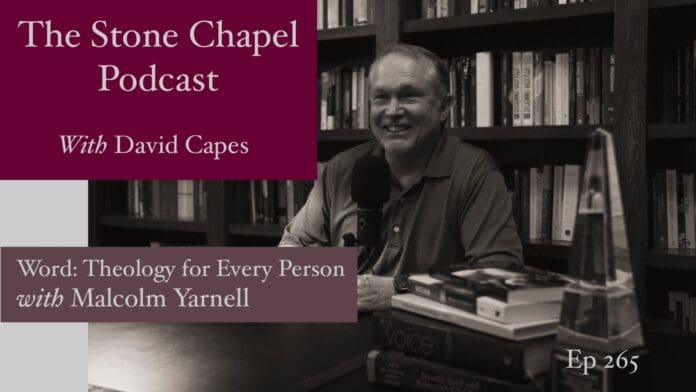► Listen on Amazon
► Listen on Apple
► Listen on Spotify
► Listen on YouTube
You can find previous episodes of “The Stone Chapel Podcast” at Lanier Theological Library.
“The Stone Chapel Podcast” is part of the ChurchLeaders Podcast Network.
This episode has been edited for clarity and space.
Malcolm Yarnell
Hi. My name is Malcolm Yarnell. I’m a research professor of theology at Southwestern Baptist Theological Seminary in Fort Worth, Texas. I’m also a part-time teaching pastor at Lakeside Baptist Church in Granbury, Texas. Thank you for having me here, David.
David Capes
Dr. Malcolm Yarnell, Malcolm, great to see you. Welcome to our podcast again.
Malcolm Yarnell
Yes, thank you for having me back. I enjoyed being with you the last time and am looking forward to being here with you and with the students here at Lanier Theological Library.
David Capes
As I remember, it was around Christmas, because the Christmas tree was up. But you’re teaching for us in our Lanier Certificate in Theology and Ministry course. It’s a program of study. We’d love for people to know about the program and come join us. There are a lot of in-person classes, but we’re also developing assets online for people, so that they would have more access to your book and other materials later. Be looking for those. You can find those very easily on our new library website. Now, Malcolm, you’re a systematic theologian; we ought to say.
Malcolm Yarnell
Yes, I’m a systematic theologian. My primary field of work is systematic theology. I also teach a bit in New Testament theology, and I’m very interested in historical theology.
David Capes
You’re writing a series of books, actually, three books. One is already out. Tell us a about that.
Malcolm Yarnell
The series is “Theology for Every Person,” and it concerns how theology can be taught to people, not just academics, but everyone, I believe. And this goes along with a reformation recovery. Every Christian is a theologian, and every Christian is responsible for responding to God’s revelation in Holy Scripture and general revelation as well. And so how is it that I, as an academic, can help people who are not necessarily academics to be responsible theologians. That’s the question. That’s what I’m trying to get at. And I use the theme of a journey, that theology is a journey that we’re growing in our relationship with the Lord.
Volume 1 was about God. Volume 2 is entitled “Word.” It’s about Jesus Christ. Volume 3 is entitled “Spirit,” and it covers the whole gamut, in a Trinitarian way, of theology. Volume 1 was about God. Who he is, in his attributes. Does he exist? God, the Trinity. It’s also about revelation, general revelation, and special revelation. And theological method. How do we interpret Scripture? These types of questions were addressed in Volume 1.
Volume 2, which is our concern here today is entitled “Word,” and it’s focused on the second person of the Trinity, but not apart from the first and the third person. The first couple of chapters deal with God the Father, and who is he? The third and fourth chapters begin to get us into who Jesus Christ is, who is the Word. We look at it from a biblical perspective, but also from an historical perspective. And then we begin to deal with such questions as the doctrine of creation, the doctrine of Providence, who are human beings? And of course, that is a huge question that takes several chapters. Who are we in relation to God? Who are we as a result of sin? Who are we in our relationships with one another?
Where are we going?
And of course, then that raises the issue of, why did God become man. Why did the second person of the Trinity become Jesus Christ? Why did he assume or take on humanity to himself? That is to save us, and that, of course, brings us to the cross of Jesus Christ. And then finally, Christ’s work doesn’t end with the cross, for he rises from the dead, and he ascends to the right hand of the Father, and he reigns forever. And the wonderful news is, of course, he invites us to be with him.
David Capes
Some scholars say “participating in him”. Our life is a life of participation, of sharing. He shares in our lives. We share in his.
Malcolm Yarnell
That’s right, He assumes our humanity, and what you’ve just stated, is key, I think, to a proper recovery of good doctrine of Jesus Christ. That is that he is truly God who becomes man, so he participates in our humanity through the Incarnation. But our humanity has been corrupted by sin, so he does what we have failed to do. He perfects or recapitulates our humanity in order to obey where we did not. And therefore, because he is the perfect man. When he dies on the cross, he doesn’t die for his sin. He has no sin. He dies for our sin and therefore takes upon himself the guilt that we have, and then he rises from the dead. And he rises from the dead because not only is he man, but he is also God. Holding the deity and the humanity of Christ together is important.
And when you say participation, understand this. As man we are united with Him by the spirit in faith, but he is also God, and so he shares with us His eternality. He brings us into the very throne room of God. He shares with us his righteousness. He shares with us his love. In reality, what we’re getting is we are participating in God. We are being united with God by being united with Christ. We remain human beings, but because he is truly human and truly divine, he shares with us His eternality.
David Capes
I have heard that called Theosis by Eastern theologians.

